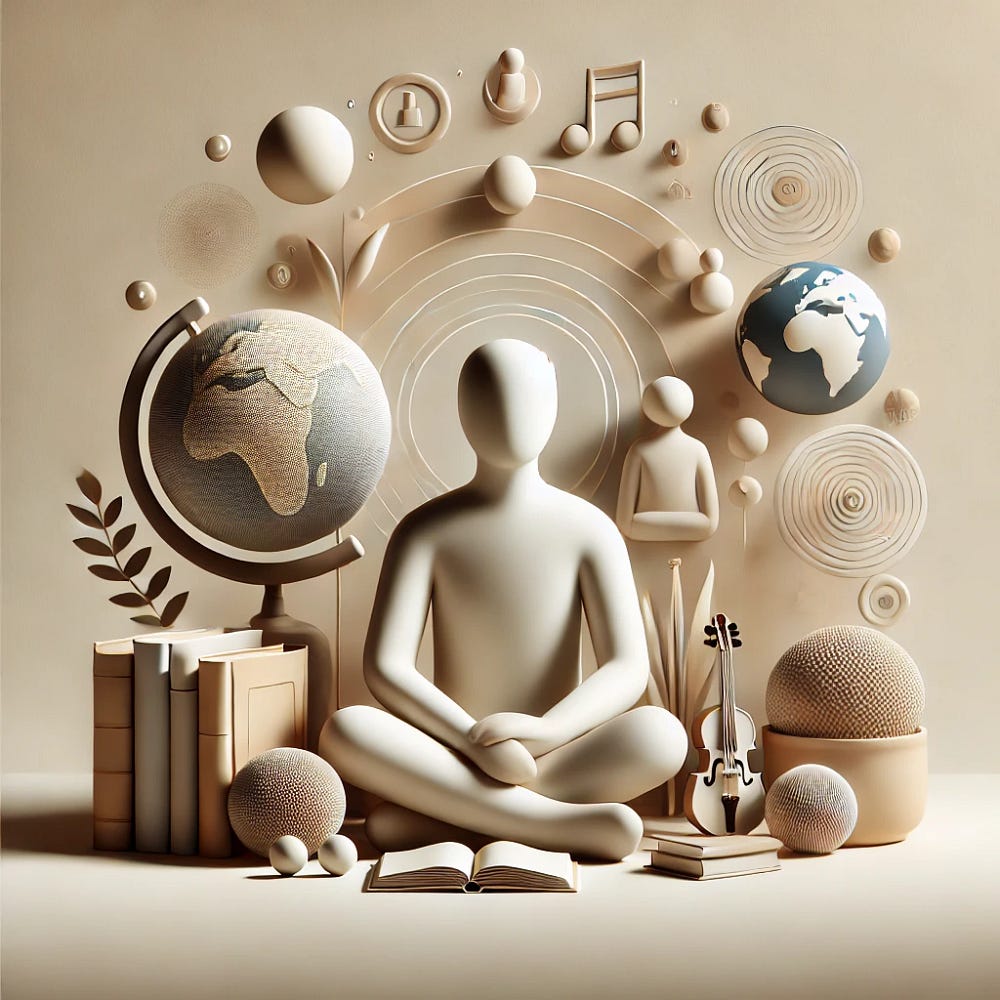I am I and my things

The Spanish philosopher Ortega y Gasset famously wrote, “I am I and my circumstance; and, if I do not save it, I do not save myself.” This phrase, which has captivated many, often remains superficially understood. However, its implications delve deeply into identity, environment, and how we relate to the world around us. Inspired by this idea, I want to explore a reinterpretation of this concept, tying it to the psychological theories of Lacan and my personal reflections as an emigrant.
Reinterpreting “I Am I and My Circumstance”
Ortega’s original statement can be reimagined as: “I am I and I am traversed by my culture, my social group, and my environment.” This highlights the fluidity of identity, which is shaped by the circumstances we are born into and those we later inhabit. We are permeable beings: we inhabit a place in the universe, and the universe inhabits a place within us. Lacan’s psychoanalysis adds another dimension: the idea that the “I” is not a fixed entity but a construct shaped by a perceived circumstance, which builds the perceived desire of the Other. In simple terms, we often define ourselves through the mirror of how others see and reflect us. This relationship is bidirectional; as our circumstances change, so too does our sense of self.
For emigrants, this becomes especially evident. We carry our cultural origins while adopting elements from new environments. We are the land where we were raised as children, adorned with the flowers of our infancy, and we are the land where we plant the seeds collected from the places we later live. This duality enriches us personally, transforming us into a garden filled with plants from every place we have been. Yet, it can also dilute our original culture. Clinging to a fixed sense of identity in a changing world is like removing new seeds that fall into our soil, leaving only the original flowers that persish with time.
It is true that not everything we collect from our changing circumstances are flowers; we also gather cacti and rocks. But it is up to us to reorganize these elements, like a skilled gardener, to create a harmonious whole.
“If I Do Not Save It, I Do Not Save Myself”
Ortega’s phrase has a second part: “And if I do not save it, I do not save myself.” This underscores the importance of taking care of our circumstances, environment, and social groups to fully understand and direct our lives. For Lacan, the self cannot exist independently of the world; our desires and identities are intertwined with the people and whatever around us. The people and circumstances in our lives often become extensions of who we are.
I Am I and My Things
A complementary idea emerges: “I am I and the things that matter to me.” The objects or activities we choose to surround ourselves with or immerse ourselves in are not just material possessions or frivolous pastimes; they represent our desires and identity. Freud’s concept of displacement explains how we project our essence onto the things we own, create, or do. For me, this means that neglecting the things that matter to me is equivalent to neglecting myself. Ignoring the things that surround me is a failure to be present in my own life.
Reflections and Personal Lessons
I have learned these lessons the hard way, through mistakes and missteps. In my interactions with people — even those I care deeply about — there were times when they mentioned feeling disconnected from me because I didn’t express interest in the things that mattered to them. I was unaware that ignoring their passions and interests was a form of neglect. I now recognize that most people don’t fully know who they are, so they project their identity onto the activities they do or the things they possess: “I play the saxophone,” “I am a painter,” “I am a family woman,” “I am an actress.” Recognizing the value of these “things” — whether they are books, conversations, activities or personal projects — has been a turning point in my understanding of the world.
Conclusion
Identity is not a fixed point; it is a journey shaped by our circumstances, our relationships with others, and the things that matter to us. As Ortega said, “If I do not save it, I do not save myself.” To truly understand who we are, we must reflect on our environment and our connections within it to truly understand the dynamics of humanity.
So, I leave you with this question: What are the things that represent you? How has your environment shaped who you are? Let’s continue this conversation in the next entry.


Comments
Post a Comment